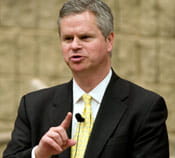But panel, looking to potential capital 'on the sidelines,' sees some reason for hope, if not immediate rescue
1/24/2008 - Sinkhole, or something rather like it. That's how some commercial real estate experts are regarding their field in light of current market conditions.
Five Kellogg School alumni shared their consensus view during a Jan. 23 panel discussion titled, "Pothole or Sinkhole? The Impact of the Loss of Easy Credit on Commercial Real Estate." The 90-minute session, held in the school's Donald P. Jacobs Center, featured real estate veterans who found plenty to worry about as they surveyed the lending squeeze that has tightened the availability of capital in recent months.
 |
| Erwin Aulis '82 moderated a Jan. 23 panel discussion at the Kellogg School that assessed the current market for commercial real estate. |
| Photo © Nathan Mandell |
Panel moderator Erwin Aulis '82 offered a gloomy assessment. "Sinkhole," said Aulis, COO of Northwood Investors LLC. He compared the current fallout from widespread subprime lending in the United States to the economic malaise of the early 1990s. "This is as bad as 1992 or 1993," he declared.
Colleagues agreed, though some modulated their responses while failing to offer a much sunnier perspective.
"This isn't a speed bump," said Robert Underhill '84, a managing director of Shorenstein Company who has more than 25 years of experience in real estate investment. "It's a multi-car pileup on the interstate, but not a sinkhole." He said that although the next 12 to 18 months will prove "difficult," he already sees the seeds of a possible recovery. "There's too much capital [currently] sitting on the sidelines" waiting to be invested, he said. As a result, the real estate market will likely attract value-seekers.
However, Underhill noted that lending conditions now make it challenging to raise money for a new fund unless those involved have résumés loaded with proven success.
Earl Webb '81, CEO of Jones Lang LaSalle's capital markets group, said he believed economic fundamentals were still sound but that "the debt market is closed," making it tough to pursue ventures with any significant risk attached to them. "The perception of risk has clearly changed," he said, adding that there has been an underlying risk repricing, with the burden falling onto those who should carry it. Investors can find "pretty decent values" in commercial real estate today - senior housing was one example he indicated - but Webb cautioned that pricing has yet to reach equilibrium.
Speaking about lax lending conditions and real estate practices that had prevailed until recently, Webb said these factors had contributed to easy credit and some imprudent investments. But this landscape has dramatically shifted to embrace the rudiments again: "We will have amortization now. There will be debt service coverage [a performance ratio used as a benchmark]. We will have lenders with new underwriting services."
This return to a more sober approach was welcomed by the panel's youngest member, Adam Falk '07, managing director for Transwestern Investment Company. Falk said he "hoped" the market turn was "just a pothole," but that in any case the economic troubles were the result of a "broken system" whose malfunction he attributed to "obvious reasons that people saw coming," including conditions where investor "greed exceeds fear." (The converse, he said, is hardly better. When fear exceeds greed, "nothing gets done.")
In recent years, Falk said, "some really bad ideas and operators got money; that's just not going to happen anymore." Players will need a track record to attract capital, said the Kellogg graduate. "I don't think that's bad. That's very good for the long-run."
In the short-run, some panelists also saw reason for optimism. Webb noted that there is more equity in today's market than he has ever seen in his career dating back more than two decades. Jeff Johnson '83, principal at Lakeshore Holdings LLC, pointed to investment opportunities even in a down market.
"There is still great stuff to buy. There are deals out there," he said, indicating that investors should review the papers and look closely at the double-digit dividends still being paid by some REITS. "Most of the market doesn't want to catch that falling knife, but if you're a value investor, there is great opportunity," said Johnson.
The 90-minute discussion was sponsored by the Kellogg School's
Real Estate Management Program in partnership with the
Guthrie Center for Real Estate Research and the school's
Office of Alumni Relations.
The event began with an attempt to inject a little humor into an otherwise grim financial context: A slideshow, narrated by Aulis and Falk, presented a parody of the Dr. Seuss classic
Green Eggs and Ham.
In the updated version - created by Cameron Crise, an American investor working in London - the disreputable Broker Joe tries to cajole the narrator into purchasing a variety of dubious financial products, including collateralized debt obligations (CDOs), an asset-backed security whose complexity some have implicated as contributing to the subprime fallout.
But the protagonist resists temptation with the sort of iron discipline that Webb said is being forced on buyers in today's market.
And that's good news, he said.






